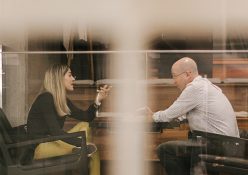Believe weight gain is inevitable once you hit 40? Think again! MAN explores the commonly held myth that it’s impossible to lose weight as you get older
Is there a point in your life when you just need to throw in the sweat towel, simply accept that your body is changing and there’s nothing you can do about it, except sit back and enjoy the ride (along with some ice cold beers)? Well, we’re alwaysall about enjoying the ride. However, hitting the big 4-0 does not mean that you hand over all control of your body. Nope, there are things you can do to get your body fighting back against a slowing metabolism – with maybe a little more joint pain than usual.
THE TRUTH
There are some shards of truth to the widely believed idea that it gets more and more difficult to stay in shape as we get older. Your body definitely changes as you age – there’s no getting around that. But if you focus on nailing a consistent exercise routine and eating well, the effects of ageing can be radically mitigated, if not reduced. Our hormone balance shifts in ways that can encourage weight gain. For example, testosterone and DHEA levels decline in men, and in women, insulin-regulating hormones become less effective. These changes can decrease muscle mass, slow down metabolism (about 2% per decade after age 30), and sap your energy levels. But all is not lost. It just means that you’ll need to be more dedicated to eating clean and moving your body, which will help to keep your hormones balanced and metabolism firing.
PROTEIN & MUSCLES
As we get older, something happens inside the muscles. Sarcopenia is a loss of muscle mass, and the number-one reason for it is, you guessed it, age. It’s seen as inevitable, and the reasons for it happening are linked to a reduction in nerve cells responsible for sending signals from the brain to the muscles, lower concentrations of some hormones (including testosterone) and a decrease in the ability to turn protein into energy. While it may be something we can’t avoid, its severity is dictated by diet and exercise. Physically inactive people can lose as much as 3–5% of their muscle mass each decade after 30. Weight and resistance training has also been proven to help slow down the onset of sarcopenia. Outside of the gym, what you put on your plate can help too – namely protein.
One study found that men and women between 70–79 who ate the most protein lost 40% less lean mass than those who ate the least protein. How does that work? Muscles burn more calories, increase your insulin sensitivity, and keep your testosterone production higher so that you can help stave off age-related health conditions. Increasing your protein intake from 15% of your total calories to 30% can help you boost the calories your body burns during digestion, which may just help speed up weight loss. This helps to prevent lean muscle protein breakdown that decreases muscle mass percentage, increases fat percentage, and slows the metabolic rate.
THAT WAS INTENSE
You’re only in your 40s. You can keep your workouts intense, if not more intense than usual. People think that as they get older, they need to change the way they exercise, to avoid injury. Yes, you become prone to inflammation and potential injuries as you age, but there are basic precautions you can take to avoid this, such as warming up and cooling down properly, stretching on rest days, and taking supplements for your joints. Don’t just let exercise slide as you get older. Your body needs exercise the way it needs oxygen and water. It is crucial to maintain muscle mass: 500 g of muscle burns three times more calories than 500 g of fat. Try to challenge yourself and intensify your workouts by adding 20 minutes of resistance training or by increasing the incline on the treadmill.
Photography: Pexels





